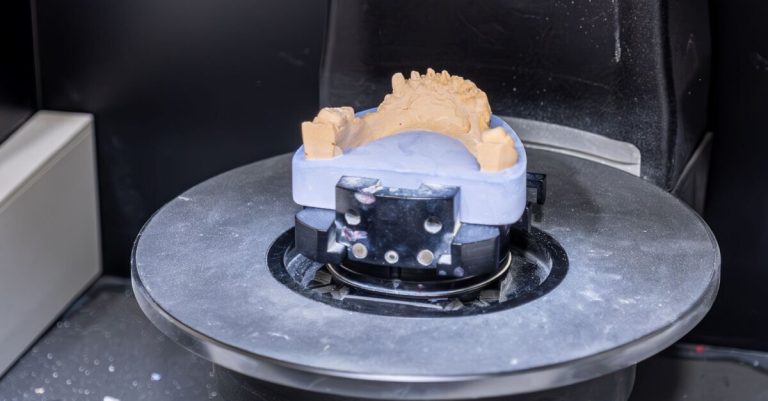INDIANAPOLIS, USA: Where time can realistically and safely be saved in dental and restorative treatments, so can money and chairside time. A new case series has documented the trial and use of 3D printed full dentures with a shell as a diagnostic tool in implant design and provisional restoration fabrication to accelerate full restoration. The research highlights the potential of this approach to simplify and streamline the procedure and save clinical and laboratory time, offering improved aesthetic and functional outcomes.
With technological advances in implant design, imaging, and fabrication, there is a shift toward more efficient design and execution of implant-supported restorations. Digital technologies such as CAD/CAM have introduced new possibilities for creating precision dental devices, including surgical guides and prostheses. These tools allow dentists to overcome clinical challenges such as difficulty in evaluating the occlusal level and complex surgical procedures, making digital workflows suitable for full implant restoration.
Complete dentures with 3D printed shell
Conventional methods involve creating radiographic templates from double dentures or desired tooth arrangements to ensure ideal occlusion and aesthetic outcome, while full dentures with 3D printed shells are produced from scans of the patient’s existing dentures. They allow clinicians to assess critical esthetic and functional parameters, such as facial support, lip position, vertical dimension of occlusion, and buccal plane orientation, before proceeding with implant placement. These dentures serve as a diagnostic aid, allowing clinicians to visualize, validate, and modify prosthetic parameters without changing the patient’s existing prostheses. This approach is beneficial in identifying esthetic and functional deficiencies and planning the necessary modifications to create ideal final restorations.
These shell dentures guide the planning of the implant position and the design of different types of temporary prostheses. As diagnostic devices, they support the transfer of intraoral relationships to a semi-adjustable articulator and the determination of the intraoral fit required prior to provisional delivery of the prosthesis.
Using existing dentures as a template, 3D printing simplifies the creation of temporary restorations, saving time and resources. This efficiency is especially valuable in cosmetic dentistry, where patient satisfaction and reduced treatment time are paramount.
The cases presented
The study presents a case series involving three patients who underwent full arch restoration using the 3D shell denture protocol. Each case illustrates the practical application and advantages of this technique.
The first patient presented with a maxillary complete denture, damaged mandibular teeth, reduced vertical occlusal dimension, irregular buccal plane and unstable occlusion. Treatment included maxillary and mandibular temporary prostheses, followed by final maxillary complete denture and mandibular implant complete denture. The use of 3D printed shell dentures allowed accurate evaluation and improvement of esthetic parameters.
The second patient presented with severe maxillary resorption, partially edentulous mandible, reduced vertical occlusal dimension, and irregular mafic level. Treatment consisted of placement and immediate loading of six implants with a temporary full denture, followed by a final maxillary full denture and restoration of the #46 periodontal site with implant support. 3D-printed shell full dentures facilitated the precise placement of implants and improved their aesthetics.
The final patient presented with a severely resorbed maxillary arch, overerupted mandibular anterior teeth, and mobile maxillary and mandibular prostheses that showed excessive wear, irregular occlusion, significant discoloration, and multiple repairs, indicating anterior overfunction syndrome. The treatment included four zygomatic implants for the maxillary arch, restored with a temporary maxillary full denture and a new mandibular removable partial denture supported on two implants. The 3D-printed full denture approach with a shell enabled the effective management of complex anatomical changes and ensured satisfactory esthetics and functionality.
Key ingredients for success
The researchers emphasized the importance of thorough data collection and extraoral and intraoral evaluation in designing implants from scratch for full arch restoration. By providing a tangible representation of the intended treatment, 3D-printed shell dentures supported communication between the prosthodontist, oral surgeon, and patient and encouraged patient acceptance of the treatment.
The procedure reduces the need for extensive occlusal adjustments and speeds up the creation of temporary restorations, offering a significant time-saving advantage over traditional methods. In addition, the ability to customize prosthetic devices based on the patient’s existing dentures ensures that aesthetic and functional parameters are tailored to individual needs. The accuracy and precision of 3D printed full dentures lead to better implant placement, improved esthetic outcomes, and improved patient satisfaction, aligned with the goals of cosmetic dentistry and restorative practices.
The study entitled “3D Printed Shell Complete Dentures as a Diagnostic Aid for Implant Design and Fabrication of Interim Restorations for Full Arch Restoration: A Case Series”, published online on July 22, 2024 at Journal of Prostheticsbefore inclusion in a topic.
Subjects:
Tags:
Live webinar
Thu Oct 17, 2024
6:00 p.m. EST (New York)

Dr. Eduardo Heck Gonsalves
Live webinar
Tue 22 October 2024
3:00 p.m. EST (New York)

Prof. Dr. Titian Testori MD DDS FICD
Live webinar
Marry. October 23, 2024
12:00 p.m. EST (New York)

Dr. Ahmet Orgev DDS, MSc, MSD, FACP
Live webinar
Marry. October 23, 2024
1:00 p.m. EST (New York)

Dr. Riccardo Ammannato DDS
Live webinar
Marry. October 23, 2024
8:00 p.m. EST (New York)
Dr. Ira Lumster DDS, MMSc, Editor-in-Chief, Dr. Zachary Brian, Mr. Eric Berger
Live webinar
Thu 24 Oct 2024
12:00 p.m. EST (New York)

Prof. Roland Frankenberger Univ.-Prof. doctor dent.
Live webinar
Thu 24 Oct 2024
12:00 p.m. EST (New York)

Dr. Josette Camilleri


